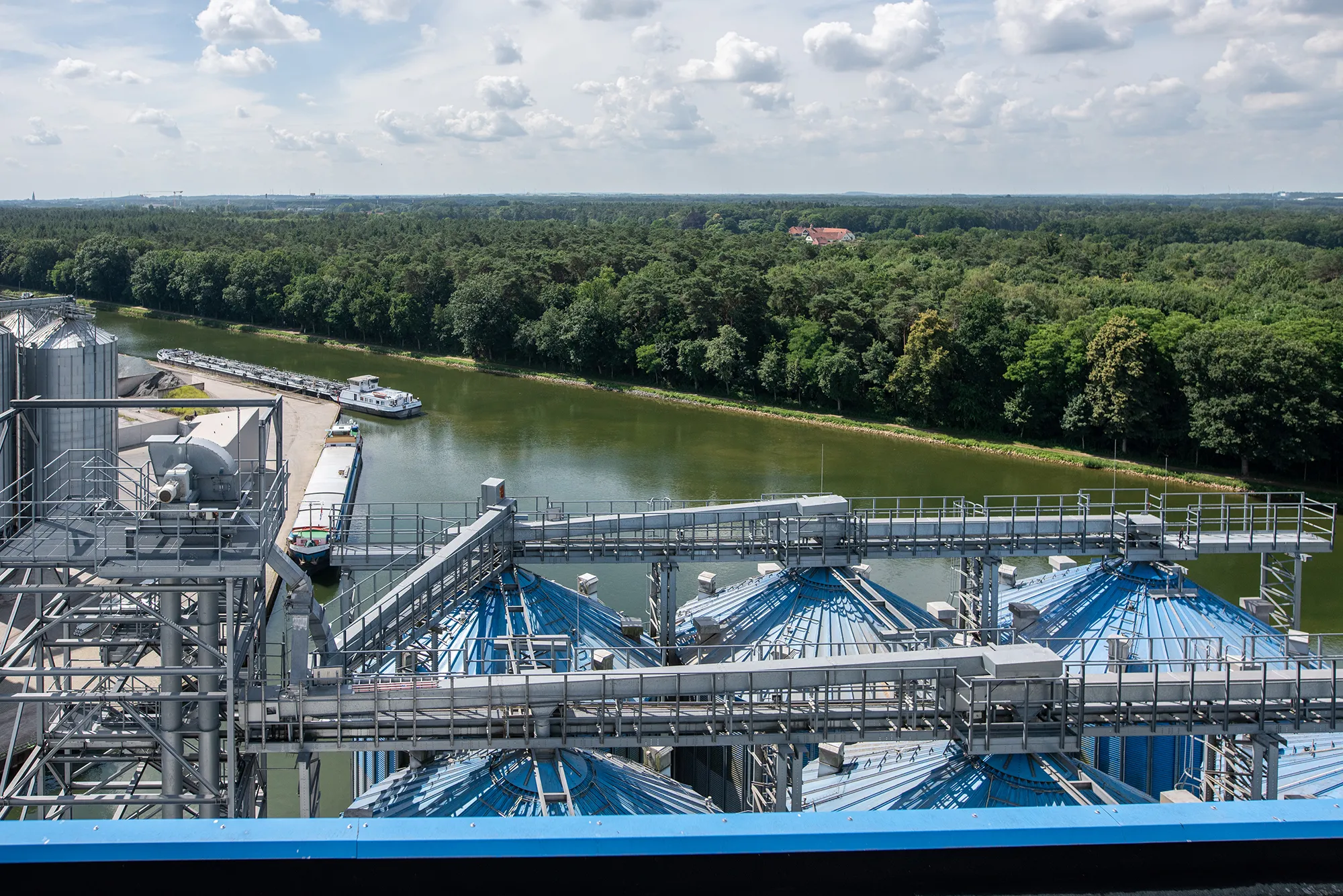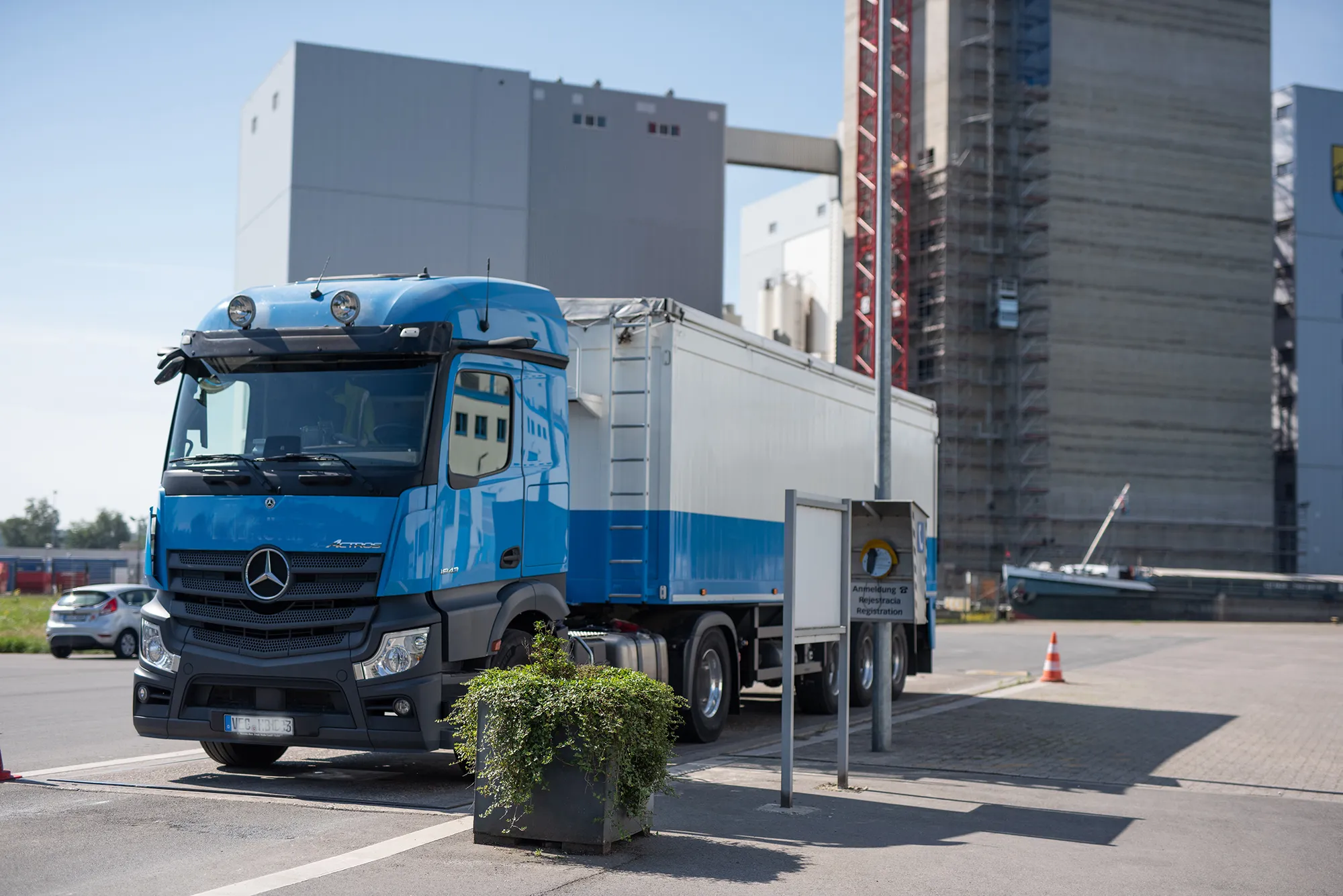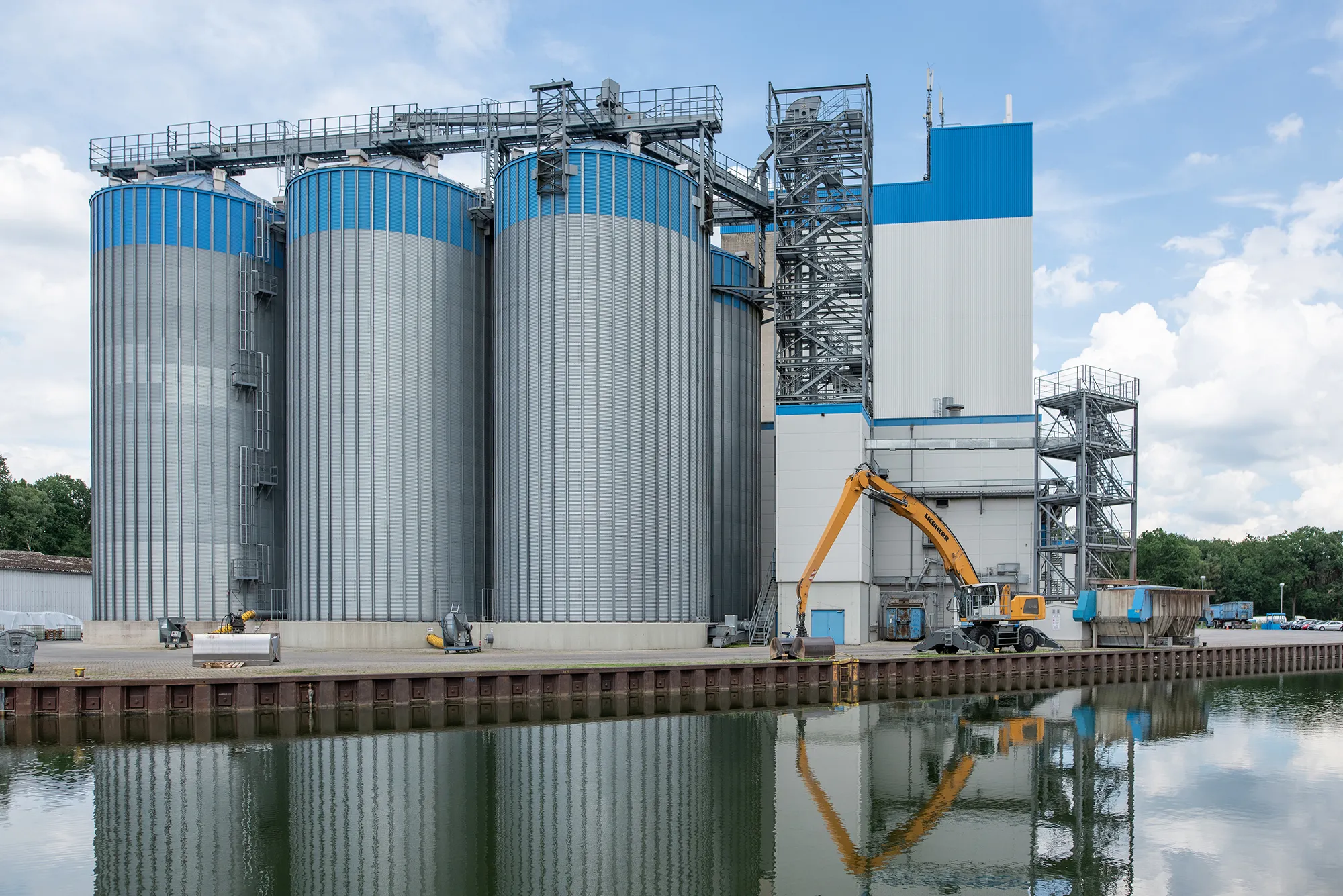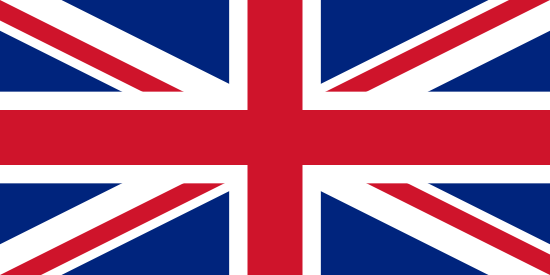The Qualimat Transport standard belongs to the standard setter Oqualim. The mutual recognition between Qualimat Transport and QS relates to the transportation of feed.
QS companies can deliver into the Qualimat/Oqualim scheme on the basis of their QS certification. To do this, the companies register in the QS database, select the relevant location, go to the Recognitions
tab in the location data, select Recognition in third-party systems
and check the Qualimat
box. An annual QS audit is a prerequisite for recognition by Qualimat Transport.
Qualimat companies can become QS scheme participants on the basis of their audit. To do so, they register directly in the QS database. Once the scheme contract has been concluded, the companies are published in the scheme partner search of the QS database as eligible to deliver.

Feed trade

The feed trade acts not only as a link between the feed producers and the livestock farmers, but also between all feed businesses involved.
Feed traders therefore play a key role in maintaining product quality and implementing quality assurance measures. These include the procurement of flawless feed material as well as proper storage and traceability of this material. The requirements for feed trade are outlined in the Guideline Feed Sector. Qualified auditors monitor compliance with the requirements regularly and independently.
The producers arrange for continuous testing of their products by QS-recognised laboratories within the framework of feed monitoring of QS.

Feed transport

Feed transport is subject to strict hygiene and safety requirements - whether by road, rail, or water.
The requirements for feed transport are outlined in the Guideline Feed Sector. Qualified auditors monitor compliance with the requirements regularly and independently.
One key criterion for the transport of feed is the cleaning of the vehicles and transport containers. For this purpose, QS has compiled a database (IDTF database) together with other standard owners of the international feed sector outlining the requirements for the cleaning of loading areas during the transport of loose feed.

Storage and transhipment

To ensure full transparency and seamless quality assurance, QS also integrates storage and transhipment companies. Among other things, this ensures that feed is stored and transhipped in a hygienically flawless manner.
The requirements for storage and transhipment are outlined in the Guideline Feed Sector. Compliance with the requirements is monitored regularly and independently by qualified auditors.
Documents
Guideline Feed Sector info_outline
Tip:
To save paper we recommend to print just the chapters of the Guideline that are relevant for you. Additionally and depending on the company, the requirements of Annexes 9.1-9-7 resp. further documents are relevant, which you can print out separately.
- Production:
Chapter 1-3 - Private Labelling:
Chapter 1-3 - Trade:
Chapter 1, 2, 4 - Road Transport:
Chapter 1, 2, 5 - Charterer for railway, inland waterway or ocean ships:
Chapter 1, 2, 6 - Storage and transhipment:
Chapter 1, 2, 7 - VLOG Add-on Module:
Annex I VLOG add-on moduleOhne Gentechnik
/VLOG geprüft
Annex 9.1 Recognized standards info_outline
Annex 9.2 Gate-Keeping regulation info_outline
Annex 9.3 Certification obligation for feed companies info_outline
Annex 9.4 Exclusion list info_outline
Annex 9.5 QS-list of feed materials rev02 info_outline
Annex 9.6 Quality questionnaire for the procurement of former foodstuffs info_outline
Annex 9.7 Supply of products from vegetable oils and fats info_outline
Annex 9.5 QS-list of feed materials rev02 info_outline
Checklist Feed Sector multi site certification
Checklist Internal audit Feed sector
Checklist Feed Sector (Spotaudit)
Checklist Feed Sector
Declaration of consent and commitment Trader of packaged products QM-Milk (Stand: 14.11.2024)
Explanation: Labelling of QS products (feed sector) (Stand: 01.07.2024)
Explanation: Incident and crisis management (feed sector) (Stand: 01.07.2024)
Protection against feed fraud - Questionnaire (Stand: 15.11.2021)
Sample form: HACCP requirements for the transport of feed (Stand: 24.06.2024)
Explanation: Protection against feed fraud (Stand: 01.07.2024)
Paper of incident feed
Template for the inclusion of service providers in the stage feed sector
Authorisation for data release
Add-on module VLOG for the feed sector info_outline
Annex 4.1 Soybeans products scope QS-Soyplus
Annex 4.2 Recognized standards for the soybean production rev02
Annex 4.3 Recognized systems for the add-on module QS-SoyPlus for feed trade and production rev02
Add-on module QS-Soyplus rev01
Documents
Guideline Feed Monitoring info_outline
Annex 8.8 Analysis spectrum for antibiotic active substances info_outline
Annex 8.7 Evaluation criteria laboratory performance assessment info_outline
Annex 8.3 Analysis spectrum for Pesticides info_outline
Annex 8.2 Table of Limit-/QS Guidance Values info_outline
Annex 8.1 Table of Parameters and Methods info_outline
Annex 8.6 Ad-hoc monitoring plans info_outline
Annex 8.4 Registration form for laboratories info_outline
Annex 8.5 Additional control plans (Stand: 11.09.2025)
Annex 8.1 Table of Parameters and Methods info_outline
Annex 8.2 Table of Limit-/QS Guidance Values info_outline
Annex 8.3 Analysis spectrum for Pesticides info_outline
Annex 8.4 Registration form for laboratories info_outline
Annex 8.6 Ad-hoc monitoring plans info_outline
Annex 8.7 Evaluation criteria laboratory performance assessment info_outline
Annex 8.8 Analysis spectrum for antibiotic active substances info_outline
Annex 8.5 Additional control plans (Stand: 11.09.2025)
QS approved laboratories feed monitoring
Explanation: Sampling and Retained Samples (Stand: 01.01.2022)
Sample form: Request for a Site-Specific Control Plan (Stand: 15.11.2021)
Sampling in agricultural companies (Stand: 15.11.2021)
Data key Designations of Premixes and Feed Additives in the QS database (Stand: 15.11.2021)
QS Agreements
QS actively promotes cooperation with other standard owners across national borders, so that everyone can rely on each other. In the interests of food and feed safety, QS maintains a close exchange with the standard owners- a good basis for joint further development.
Qualimat Transport (Oqualim)
OVOCOM (FCA)
The mutual recognition between the standard FCA and QS refers to the scopes production, trade, private labelling, transport, storage and transhipment of feed.
QS companies can deliver into the OVOCOM scheme based on their QS certification. For this purpose, the companies log in to the QS database, select the appropriate location, click on Recognition by third party systems
via the tab Recognitions
and place a tick at OVOCOM
. The precondition for the recognition by OVOCOM is an annual QS audit.
In return, FCA certificated companies can become QS scheme participants based on their audit. For this purpose, the companies register directly in the QS database. After signing a scheme agreement, the companies are published in scheme participant search of the QS database as eligible to deliver.
Further information can be found in Annex 9.1 to the Guideline Feed Sector.
Oqualim
The mutual recognition between the French standard Oqualim and QS relates to the production of compound feed, feed materials and premixtures as well as their trade and private labeling.
QS companies can deliver into the Oqualim scheme on the basis of their QS certification. To do this, the companies register in the QS database, select the relevant location, go to the Recognitions
tab in the location data, select Recognition in third-party systems
and check the Oqualim
box. An annual QA audit is a prerequisite for recognition by Oqualim.
All Oqualim-certified companies that meet the RCNA International standard and the additional module Annex 1: Purchase requirements for goods and services
and wish to be authorized to deliver into the QS scheme are published on the Oqualim website (www.oqualim.fr) and in the scheme participant search of the QS database under recognized Oqualim companies (France)
.
Further information can be found in Annex 9.1 of the Feed Sector Guideline.
Translated with DeepL.com (free version)
GMP+ International (GMP+ FSA)
The mutual recognition between GMP+ International and QS refers to the scopes production, trade, private labelling, transport, storage and transhipment of feed as well as the QS inspection for Mobile feed milling and mixing plants.
QS companies can deliver into the GMP+ scheme based on their QS certification. For this purpose, the companies log in to the QS database, select the appropriate location, click Recognition by third party systems
via the tab Recognitions
and place a tick at GMP+ Int.
. Afterwards, producers of compound feed or feed premixes must contact GMP+ directly in order to deliver into the GMP+ scheme. This does not apply to producers of feed material and additives, traders, private labellers, transporters and storages. The precondition for the recognition by GMP+ International is an annual QS audit. The responsible certification body deposits the recognition request for the recognition of small-scale feed material producers and for Mobile feed milling and mixing plants.
GMP+ companies that want to deliver into the QS scheme register in the QS database. Producers of compound feed and premixes are published in the scheme participant search as eligible for delivery after signing a scheme agreement. Producers of feed materials and additives, traders, transporters and storages do not have to sign a scheme agreement for this purpose.
Further information can be found in Annex 9.1 to the Guideline Feed Sector.
FamiQS (FamiQS asbl.)
The mutual recognition between Fami-QS and QS refers to the production and trade of additives, premixtures, feed material as well as special compound feed (complementary/dietetic feed).
QS certified companies can deliver to the Fami-QS scheme based on their QS-certification. For this purpose, the companies log in to in the QS database, select the appropriate location, click on Recognition by third party systems
via the tab Recognitions
and place a tick at Fami-QS
.
In return Fami-QS certified companies can receive the eligibility of delivery into the QS scheme. For this purpose, the companies register in the QS database and sign a QS scheme agreement. Afterwards, the companies are published in the scheme participant search of the QS database as eligible to deliver.
Further information can be found in Annex 9.1 to the Guideline Feed Sector.
AMA (pastus+)
The mutual recognition between QS and Agrarmarketing Austria GesmbH refers to the scopes production of compound feed and feed material, trade, private labelling, storage and transhipment, road transport as well as mobile feed milling and mixing plants.
QS companies can deliver into the pastus scheme based on their QS certification. For this purpose, the companies log in to in the QS database, select the appropriate location, click on Recognition by third party systems
via the tab Recognitions
and place a tick at AMA
. Afterwards, the companies must contact AMA directly in order to be contractually integrated into the pastus+ scheme. The responsible certification body deposits the recognition request for mobile feed milling and mixing plants. The precondition for recognition by the AMA is an annual QS audit.
Pastus+ certified companies that want to deliver into the QS scheme must register in the QS database. The registration of small-scale feed material producers and mobile feed milling and mixing plants in the QS database is carried out by AMA. After signing a QS scheme agreement, the companies are published in the scheme participant search of the QS database as eligible to deliver.
Further information can be found in Annex 9.1 to the Guideline Feed Sector.
AIC (UFAS/FEMAS/TASCC)
The mutual recognition between QS and the UFAS/FEMAS/TASCC standards of Agricultural Industries Confederation Ltd. (AIC) refers to the scopes production, trade, transport, storage and transhipment of feed.
QS companies can deliver into the AIC scheme based on their QS certification. For this purpose, the companies log in to the QS database, select the appropriate location, click on Recognition by third party systems
via the tab Recognitions
and place a tick at AIC
. The precondition for the recognition by AIC is an annual QS audit.
AIC companies can become QS scheme participants based on their audit. For this purpose, they register directly in the QS database. After signing a scheme agreement, the companies are published in the scheme participant search of the QS database as eligible to deliver.
Further information can be found in Annex 9.1 to the Guideline Feed Sector.
FAQs
Contact
Lisa Veller
Senior Manager Feed Sector- Tel: +49 (0) 228 35068-216
- Fax: +49 (0) 228 35068-16216
Giulia Offermann
Junior Manager Feed Sector, Monitoring, Support- Tel: +49 (0) 228 35068-215
- Fax: +49 (0) 228 35068-16215
Pia Gielen
Junior Manager Feed Sector- Tel: +49 (0) 228 35068-213
- Fax: +49 (0) 228 35068-16213


